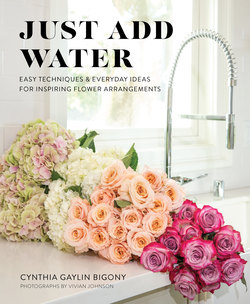Читать книгу Just Add Water - Cynthia Gaylin Bigony - Страница 26
На сайте Литреса книга снята с продажи.
Оглавление24
GETTING STARTED
PICKING
flower combinations
When I buy flowers,I am usually in a rush. Helping me narrow down my choices prevents me from overbuying and makes the process go much faster. Here are some
helpful tips I use to create flower bouquets.
ONE COLORYou can never go wrong with a single color of the same flower.True perfection is a massivebouquet of pink peonies. Actually,a massivebouquet of
anything is beautiful.
CONNECTED COLORSFor a bouquet with more variety, I take my cues from Mother Nature. Pick a flower that has two colors in it, for example, a yellow Gerbera daisy with a pink center.For the second flower in the bouquet, look for a bloom that matches the daisy’s pink center, like a pink hydrangea. Ifyou want a third flower in your bouquet, add another pink OR yellow option, like a pink or yellow rose. You know the flowers will work in the bouquet because the colors
naturally connect to each other.
MIXED COLORSIf the flower you like doesn’t have an obvious secondary color, then use the color wheel diagram below to help createyour arrangement. (Hint: take a picture ofthe diagram on your smartphone so that you will have it handy when you shop.) For a beautiful contrastingbouquet, pick colors from the opposite sides of the diagram. For a bouquet with more complementary colors, choose colors thatare nextto each other on the diagram. For an ombre effect, startwith a favorite flower, then look for flowers of the same color in graduatinghues to form your bouquet. I liketo keep brightcolors with other bright colors, pastel colors with other pastels, but feel free to experiment with what suits your own personal taste. Remember, there are no hard and fast rules—it’s all about what speaksto you personally. The page atthe
right has some of my favorite color combinations.
The classic color
wheel.
